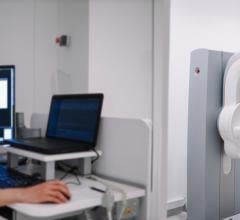
December 8, 2017 — Dutch researchers demonstrated a strong relationship between compression pressure in mammography and breast cancer screening performance. Involving more than 130,000 mammograms from the Dutch Breast Screening Program and Volpara software, the study showed that very high pressure is linked with reduced sensitivity and very low pressure translates to low specificity.
The study, "Influence of breast compression pressure on the performance of population-based mammography screening," was published in the current issue of Breast Cancer Research. In this study, the data are adjusted for volumetric density and breast volume when evaluating the impact of pressure on screening performance. Katherina Holland, Nico Karssemeijer and researchers from Radboud University Medical Centre in Nijmegen, Netherlands, measured mean compression pressure for 132,776 digital mammograms. Volumetric breast density and pressure was measured using Volpara software. The data was subdivided into five quintiles of mean pressure and the number of screen-detected cancers, interval cancers, false positives and true negatives were available for each group.
The results bolster a growing body of research that suggest that mean compression pressure is related to screening performance, with compression pressures in lower ranges leading to a higher recall rate and a higher false positives fraction, and compression pressures in the higher ranges reducing detectability of breast cancer. These findings are consistent with results from the Norwegian Breast Screening Program recently published in Breast Cancer Research and Treatment.
"Lack of consistent guidelines for mammographic compression can lead to a wide variation in execution. The study shows that adequate compression pressure is crucial for obtaining high quality exams. Both very high and very low mean compression pressure can adversely affect mammography quality. Therefore, it is reasonable to suggest that standardizing to an intermediate compression pressure may lead to better screening outcomes and a better patient experience," said Karssemeijer.
For more information: www.sigmascreening.com


 April 18, 2024
April 18, 2024 








